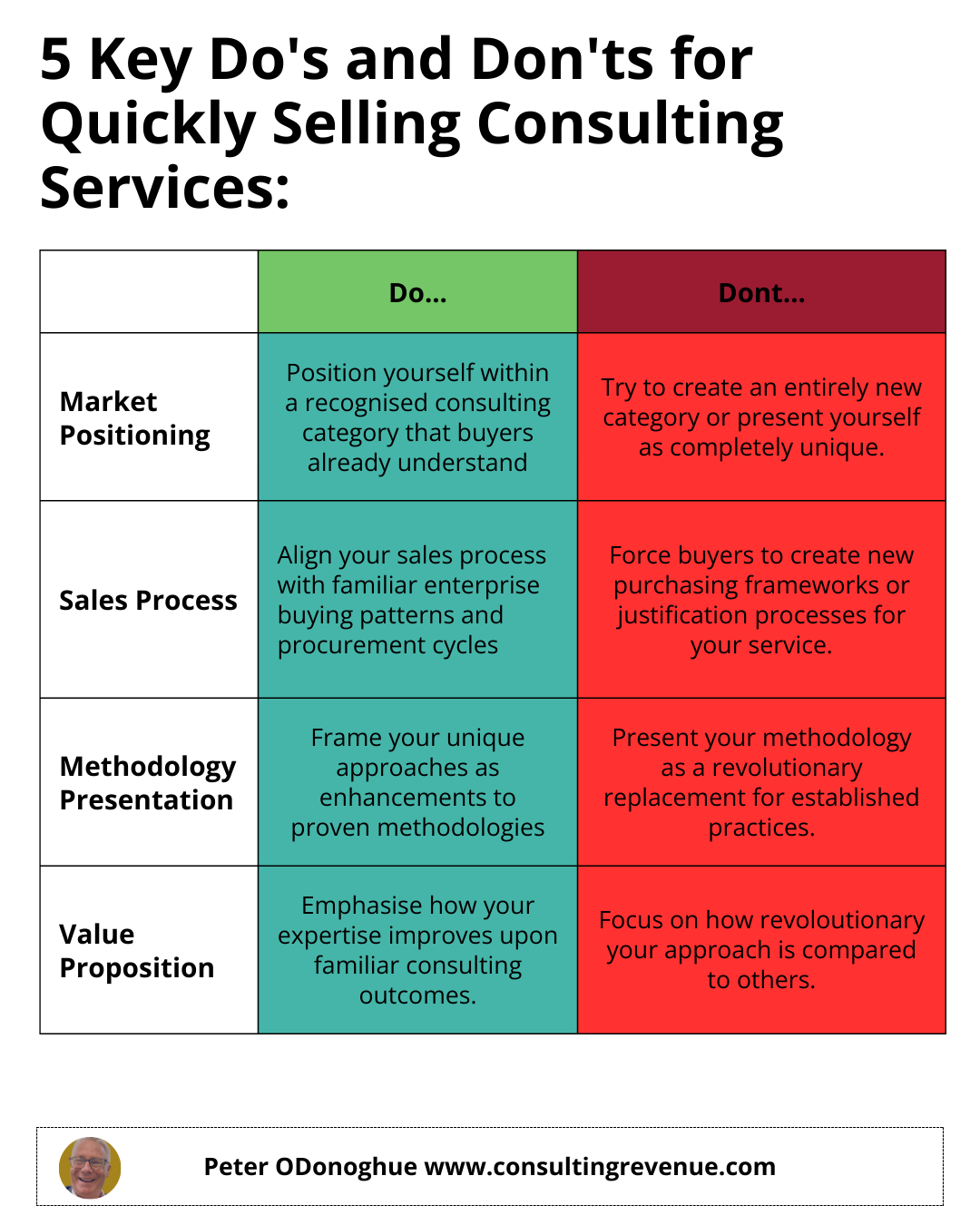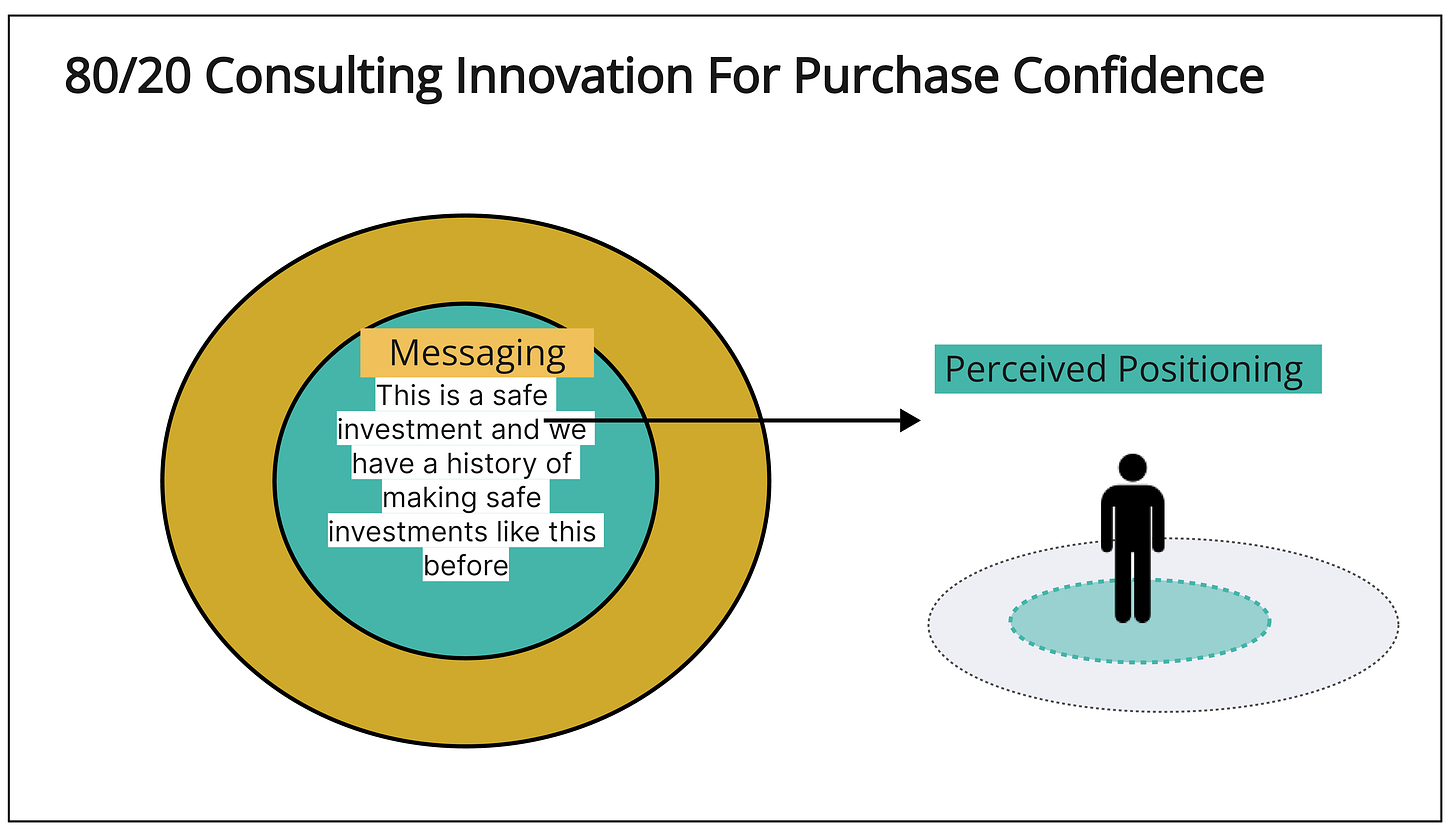The 80/20 Rule of Selling Consulting: Why Being Too Innovative Kills Your Sales
Ever sit across from a potential client who just couldn't grasp your "unique" consulting approach?
You know what I'm talking about: You've crafted an innovative methodology, developed cutting-edge frameworks, and created a truly revolutionary approach to solving problems.
Yet somehow, clients seem hesitant to commit.
And the larger the client, the bigger the hesitattion.
The harder you try to stand out, the more difficult your sales process becomes. Each pitch turns into a lengthy education session about why your approach is different.
What if the very thing you think makes you special is actually preventing you from winning bigger deals?
Let's explore why being too innovative might be your biggest obstacle to growth.
The Innovation Paradox in Consulting Sales
There's a dangerous myth in the consulting world: that radical differentiation is the key to success. We've all heard the advice – "stand out," "be unique," "differentiate or die."
This might work for technology products, but it's poison for consulting sales.
Here's why: Enterprise buyers don't want revolutionary approaches to solving their problems. They want proven solutions delivered in familiar ways. Every time you position yourself as "completely different" from other consultants, you're actually creating unnecessary friction in the buying process.
Think about it from the client's perspective. When they need to justify a six or seven-figure consulting investment to their board or executive team, they need to explain:
What category of service this falls into
Why this approach is proven to work
How it compares to known alternatives
What standard metrics will measure success
The more unique your approach, the harder you make each of these explanations.
The Enterprise Buying Psychology
Corporate buying decisions are designed to minimise risk - especially to the job security of the buyer or influencer, not maximize innovation.
The typical enterprise buying process includes:
Categorising the service
Comparing multiple providers
Checking standard references
Evaluating against familiar metrics
When you position yourself as "revolutionary" or "completely unique," you're effectively asking buyers to:
Create a new service category that they may not have purchased before
Justify a category of one
Take on additional risk
Stake their reputation on an unproven approach
This is why truly innovative consulting firms often struggle to scale beyond small projects with risk-tolerant clients.
The 80/20 Rule of Consulting Innovation
The solution isn't to abandon what makes you special – it's to package it properly.
This is where the 80/20 rule comes in.
Your consulting offering should be:
80% familiar elements that clients recognise and trust. They must be able to comfortably ‘put you in a box’. Of course, you can create the ‘box’ frame that you choose to put you in.
20% unique elements that give you an edge
The 80% includes:
Standard engagement structures
Familiar delivery models
Recognised methodologies
Traditional pricing approaches
Common success metrics
The 20% is where you shine with:
Unique insights
Proprietary tools
Specialized expertise
Distinctive approaches
Innovative elements
Implementation: Finding Your Category Sweet Spot
Here's how to implement this framework:
Identify Your Base Category Start by determining which established consulting category you most closely align with:
Strategy consulting
Operations consulting
Technology consulting
Change management
Organisation development
Adopt Standard Elements Embrace the familiar elements of your chosen category:
Common engagement structures
Standard documentation
Recognized delivery phases
Familiar pricing models
Add Your Edge Layer in your unique value within this familiar framework:
Proprietary insights
Specialised tools
Unique methodologies
Distinctive deliverables
Frame Innovation Properly - Position unique elements as enhancements to proven approaches, not replacements for them:
"Our approach builds on traditional strategy frameworks..."
"We enhance standard change management with..."
"Our proprietary tools complement established methodologies..."
Remember: The goal isn't to be revolutionary – it's to be purchasable.
Your unique value should enhance familiar frameworks, not replace them entirely.
When you strike this balance, something magical happens:
Sales cycles shorten
Deal sizes grow
Procurement becomes easier
References strengthen
You maintain what makes you special while making it easy for clients to buy.
The Next Step
Take a hard look at your current positioning. Are you making it unnecessarily difficult for clients to buy from you?
The solution might not be more innovation, but better packaging of your existing expertise.
Most experienced consultants struggle with unnecessarily long sales cycles and difficult procurement processes.
The reason is because they're positioning themselves as too unique and revolutionary in their market. When this happens, buyers can't easily categorise or justify their services. Until all of a sudden, they find themselves stuck doing endless education sessions instead of closing deals.
What I do is I specialise in helping consultants position their expertise within the 80/20 framework to make their services more purchasable.
The reason why I recommend this framework is because it's the single most effective way to shorten sales cycles while maintaining premium fees. And the benefit of implementing this framework is you'll:
Make it easier for clients to buy from you
Reduce procurement friction
Shorten your sales cycle
Increase your close rate
Maintain your premium positioning





